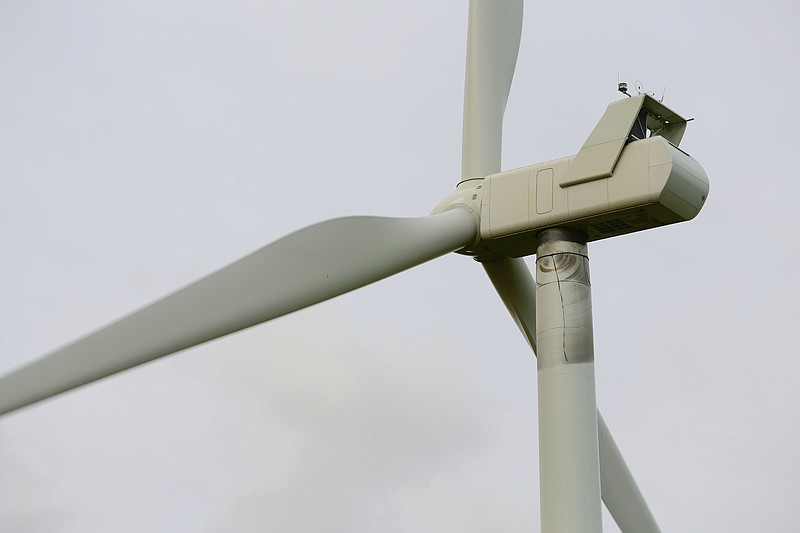BERRYVILLE -- An opponent to a wind farm in eastern Carroll County will speak at Tuesday night's Quorum Court meeting even though there is little county government could do to stop the project, both opponents and a county government official said.
Scout Clean Energy of Boulder, Colo., intends to erect wind turbines at various sites among 9,000 acres -- about 14 square miles -- south of Green Forest and west of Alpena, according to information posted by the company.
The completed project would generate 180 megawatts at peak demand, according to announced company plans. This is enough power to supply almost 30,000 homes, according to utility industry figures.
"Scout Clean Energy has been working with residents and county stakeholders on the Nimbus Wind project as far back as 2016," said Dave Iadarola, senior project manager for the company, in a statement Friday.
"We have signed voluntary lease agreements with over 50 landowners. Scout estimates that the project will pay over $14 million dollars in lease payments and bring another $25 million dollars in new tax revenue for Carroll County over the life of the project," according to the statement. "Scout is excited to bring this $300 million economic investment to Carroll County, and we look forward to sharing more information at our upcoming open-house information sessions."
Dates and locations of those open house sessions are being worked out, Iadarola's statement said.
Discussion of the project at Tuesday's Quorum Court meeting will be limited to one speaker who will have 10 minutes to address the panel when it meets in Berryville, but town hall meetings hosted by Scout Energy are being planned in April with dates to be announced, said Rhonda Griffin, assistant to the county judge. Griffin returned a call to County Judge David Writer.
Tuesday's speaker was added to the agenda at the request of a Quorum Court member, she said.
"County authority on this is limited to county road use," Griffin said. There is no county zoning or other restrictions that apply to the project, she said.
"We have 50 landowners who are thrilled to death to have a lease," Griffin said, referring to property owners leasing their land for the turbines.
The ones leasing the land don't live on the property they are leasing, said former County Judge Richard Williams. Williams said in a telephone interview Tuesday he lives near proposed sites for windmills where property owners signed leases. He said is very concerned drilling to lay deep foundations for the 500-foot tall wind turbines will spoil the underground water and springs rural residents depend upon.
As for the county not having much say in the project's construction, the county could have imposed restrictions at any time since talk of such projects started in earnest in 2008, could have kept residents better informed that this project was proceeding and at least given more opportunity for people to have their say, he said.
Williams' neighbor Caroline Rogers expressed the same concerns and more.
"I'll be surrounded by them," she said of the turbines. She doubts the broken karst topography of the area -- limestone gutted with caves and sinkholes caused by erosion -- can support the structures without foundations so deep they risk spoiling the groundwater.
She also expressed alarm at the dangers to birds and bats in the region, particularly eagles.
"They're only building them here because of the money the government's throwing at it," Rogers said, referring to federal "green energy" initiatives. Williams agreed, saying the project would not be economically viable without federal tax incentives.
Wind turbine technology has advanced a great deal since 2010, when national studies showed limited wind technology feasibility in Arkansas, said Simon Mahan, executive director of the Southern Renewable Energy Association, a Little-Rock based industry group encouraging wind energy, solar energy, energy storage and transmission solutions.
"There's a wind farm being build in Tunica, Miss., right now," Mahan said. If a wind farm is viable in the Mississippi River Delta region south of Memphis, then one is certainly viable in Carroll County, he said. Wind turbines today have longer blades and taller towers to catch stronger and more consistent winds, he said.
The strength and consistency of available wind isn't the sole -- and often not even the most important -- factor in site selection, Mahan said. For instance, access to a utility to use the power generated is vital, he said. So is avoiding historical landmarks and environmentally vulnerable areas.
As for threats to birds, wind turbines rank quite low on the list of dangers, said Erin Sauer, a post-doctoral researcher for the University of Arkansas in ecology and evolution. She is currently researching how to reduce window collisions by birds at the university's building, she said.
Flying into windows and feral cats are much greater risks to birds than wind turbines, Sauer said. To large birds like eagles, the remains of deer dressed in the field after being shot is a large danger because of lead left in the remains from shooting. Rats who died from rat poisoning are eaten by scavenging birds and that is another risk, she said. Overarching all these hazards are climate change and habitat destruction, she said.
The power lines leading from wind turbines are a greater danger to large birds than the turbines themselves, Sauer said, but those are still a minor risk.
More News
NoneOn the web
Scout Clean Energy website:
https://scoutcleanenergy.com/

